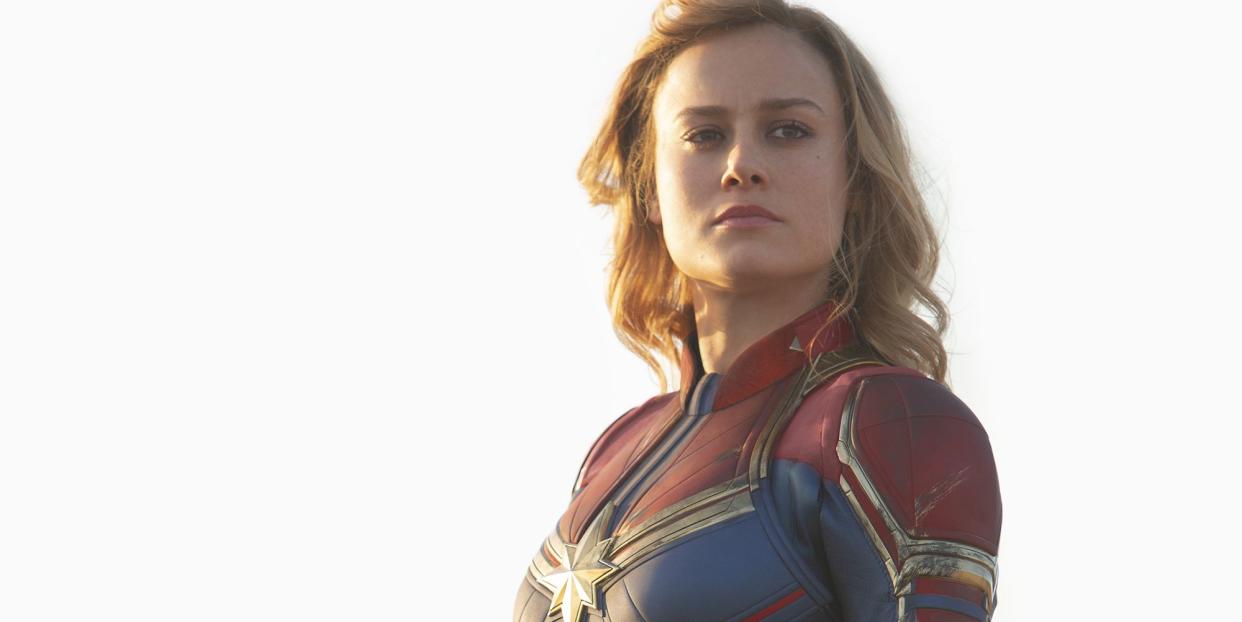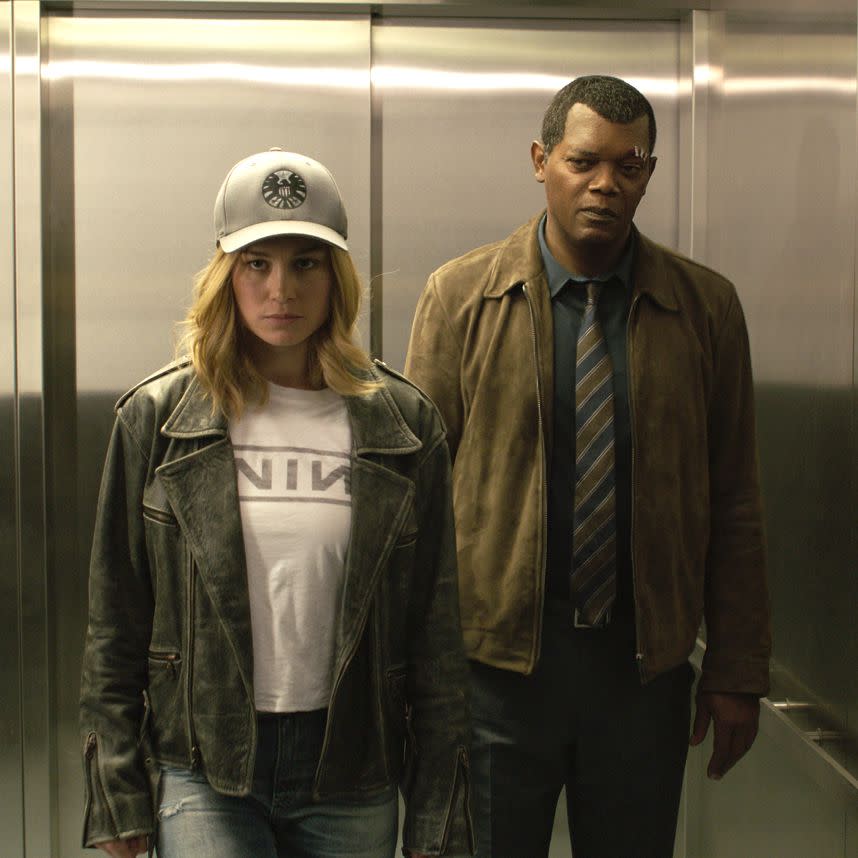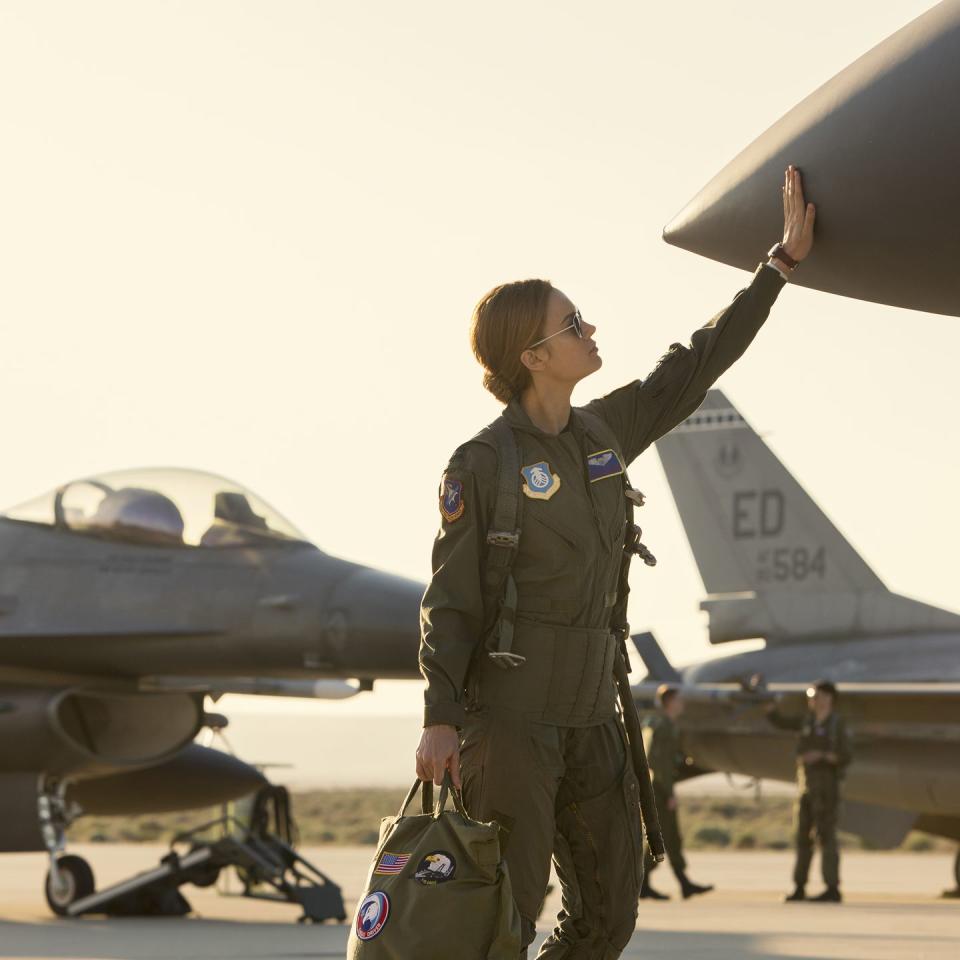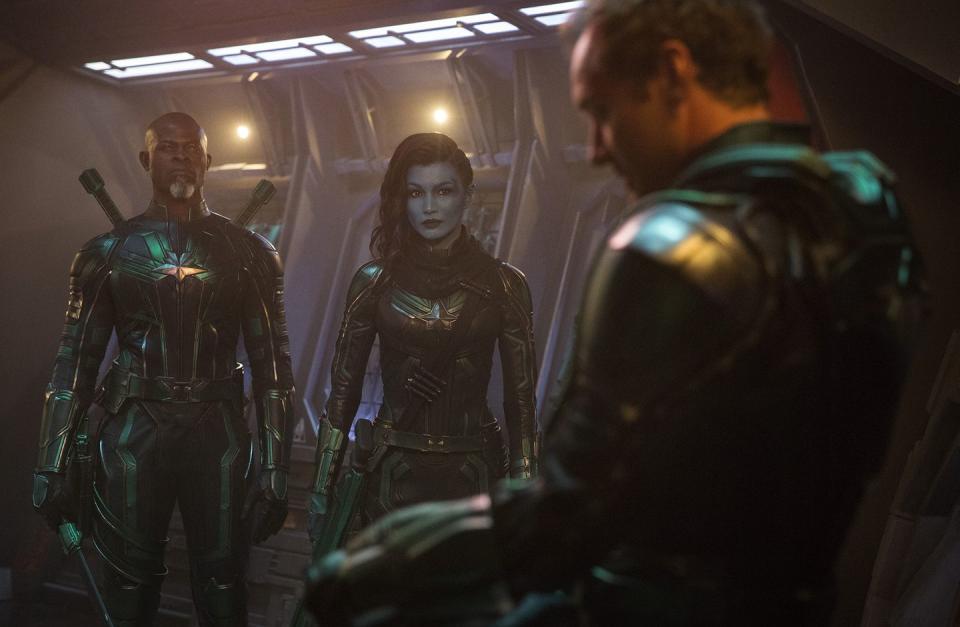'Captain Marvel' Can't Get By on Girl Power Alone

Spoilers for Captain Marvel below.
Lately, I've been thinking about what would happen if now, in my 30s, I started to re-watch the shows that resonated so deeply with me as a youth. Though I want to go back to what used to be so familiar to me, I'm worried the resonance and emotional kick shows like Buffy the Vampire Slayer offered in my teens and early 20s won't stick. I often find myself flipping through my DVD binders, tempted to pop in the finale of Buffy, which resonated with me so much back in the day: a resounding "Yay! Girl power!" message that every girl has the strength, power, grit, and resilience of a slayer-literally. But Captain Marvel has relieved me of that temptation. It turns out that in 2019, the "Yay! Girl Power!" message alone cannot carry a film.
Brie Larson isn’t the problem here. The Oscar-winning actress stars as human Air Force pilot turned intergalactic Kree hero Carol Danvers, (or Vers, as she’s known on her adopted home world of Hala), and she does the most with what she’s given from writers Anna Boden, Ryan Fleck, and Geneva Dorwet-Robinson. But in addition to its simplistic overarching message, the film suffers from arguably unfair expectations. Directors Boden and Fleck were tasked with covering a whole lot of material in the wake of Avengers: Infinity War and in the lead up to Avengers: Endgame, and that’s a lot to put on any film’s shoulders, much less your studio’s first female superhero.
For the uninitiated, a quick overview: Captain Marvel is the 21st film in the Marvel Cinematic Universe (MCU). At the end of Infinity War, an alien named Thanos decimates half of Earth’s population with the snap of his fingers, supposedly for the good of humanity. Nick Fury (Samuel L. Jackson, who also co-stars in Captain Marvel as a younger version of himself that only just misses the Uncanny Valley) is one of the vanished, but before turning to dust in the final moments of IW, he sends a distress signal via pager to Carol. At this point, the hero is unknown to the audience. (Broadly, the assumption is that she and Scott Lang, a.k.a. Ant-Man, played by Paul Rudd, will be two key players in solving the Thanos problem in the upcoming Endgame.)

Captain Marvel’s job was twofold: introduce Carol and get audiences caught up to speed on her origin story, and flesh out the war between the Kree and Skrull alien races that longtime MCU fans see briefly in Guardians of the Galaxy and Marvel’s sole network TV show, Agents of S.H.I.E.L.D.
This is all fine if you’ve seen each Marvel film-Captain Marvel is an essential viewing stepping stone to get you from Infinity War to Endgame. And the movie works if you’re a young girl for whom the simple message of “girl power!” still works. You’ll get plenty of it here, with repeated flashbacks depicting Carol as a gritty young girl (played by McKenna Grace and London Fuller) who grew up with the message that she isn't strong enough to race go-karts or play baseball with the boys, and later, that she's not good enough to train with them for the Air Force. The flashbacks to Carol wiping out in her various endeavors repeat throughout the movie before finally flipping the switch (which even the most casual movie viewer will see coming) to show us that after each failure, she got back up and pushed forward-and that’s what gives her strength. When facing betrayal by her male mentor (Jude Law’s Yon-Rogg) in the third act, Carol refuses to submit to his demands and face him in hand-to-hand combat; instead, she simply blasts him into a rock formation (a move very reminiscent of Indiana Jones vs. the swordsman in Raiders of the Lost Ark) with the words, “I have nothing to prove to you.”

It all feels very Joss Whedon-lite, and perhaps this should be unsurprising, as Whedon wrote and directed both The Avengers and Avengers: Age of Ultron. When DC’s Wonder Woman debuted, I noted that while Patty Jenkins did have a point of view, one of film’s major failings was its reliance on the established tone and aesthetic of franchise director Zack Snyder (James Wan only just broke through Snyder’s grimdark, sepia-toned DC universe with last year’s Aquaman).
Conversely, one of the things I’ve enjoyed about the more recent crop of Marvel films is the creative license the mammoth studio handed to directors handling their solo-hero films. Thor: Ragnarok, Spider-Man: Homecoming, and Black Panther each have hallmarks of an MCU film (most notably, the same issue every MCU movie has-the mandated CGI-heavy third act final boss battle), but they also have a distinct directorial perspective. Take Black Panther, for instance: From the opening moments in Oakland, there is no mistake-you are watching a Ryan Coogler joint. Captain Marvel lacks the point of view that’s made recent Marvel films feel like less of a chore-films that we all must see in order to keep up with pop culture (which happens when one studio essentially owns every franchise you love)-and more like a unique moviegoing experience. None of these films has been, say, Yorgos Lanthimos’s The Favourite, but they at least had personality.
"Larson’s calls for inclusivity for women and people of color on the film’s press tour have had more depth and nuance than the girl power message of the film she’s promoting."
Boden and Fleck’s perspective may have simply been that girls and women are strong. That’s a completely valid perspective, of course, and one I absolutely agree with! However, the message feels ham-fisted, gimmicky, and flat. Honestly, Larson’s calls for inclusivity for women and people of color on the film’s press tour have had more depth and nuance than the girl power message of the film she’s promoting. Captain Marvel’s message feels corporate, ultimately coming across as if Marvel knows they’re playing catch up. It only took DC four movies in four years to make a solo, female-led superhero movie. Marvel’s been doing this for ten years.
Given all they had to accomplish in one movie, it may be that nuance had to suffer. Storytelling did to an extent. The writers and director team attempted to tell the story in an interesting way, dropping us in media res into Carol’s life on Hala and keeping both her and the audience in the dark about her former life. And while it will certainly work for some, others may take issues with the pacing of the first act, as well as the many details revealed that are never returned to. I would've loved to learn more about Carol’s family, continuously featured in the same repeated flashback, for instance; we’re told in one throwaway line that she didn’t get along with them. The lack of even minor character development for Carol’s Hala teammates, played by Gemma Chan and Djimon Hounsou, is frustrating, while characters like Lee Pace’s Ronan may feel deus ex machina-ish to viewers who haven’t seen Guardians of the Galaxy. Meanwhile, Agent Coulson (Clark Gregg) is fairly beloved in the MCU fandom, and the Captain Marvel script sells him as a sketch of the character we’ve come to know.

And that’s the thing-like Black Panther, Captain Marvel is going to draw new viewers simply by virtue of it’s “first-ness.” Plot points need to be explained, not assumed. But while Ryan Coogler could make a film without the burden of Infinity War, one that seemed nearly detached from the rest of the MCU, Boden and Fleck could not, and so Carol finds herself differently burdened than T’Challa in addition to having to be the “first” of her kind. (We also had the benefit of meeting T’Challa and warming to him in Captain America: Civil War, where as Carol simply got an icon on a pager.)
It’s not that Carol can’t handle this burden. She is a character 100 percent capable of being that pillar of strength, and Larson can both deliver a quippy line read and portray a hero’s inner demons just as well as Robert Downey Jr. She also bounces off co-stars Jackson and Lashana Lynch, who plays another former Air Force pilot, Maria Rambeau, with chemistry and ease. And Ben Mendelsohn as Talos, the leader of the alien Skrulls seeking a refuge from home, provides both humor and a superb emotional anchor. Watching Carol, Talos, and Maria play off of each other in Maria’s Louisiana home offers some of the most engaging moments of the film.
But while there were high notes, the film overall leaned far too much on its girl power message-so much so that it doesn't feel organic. While I will be thrilled for every little girl who finds some source of strength or courage in Carol Danvers, it must be said that where Captain Marvel could have soared much like its titular character, it simply fell flat.
Get tickets for Captain Marvel
('You Might Also Like',)

